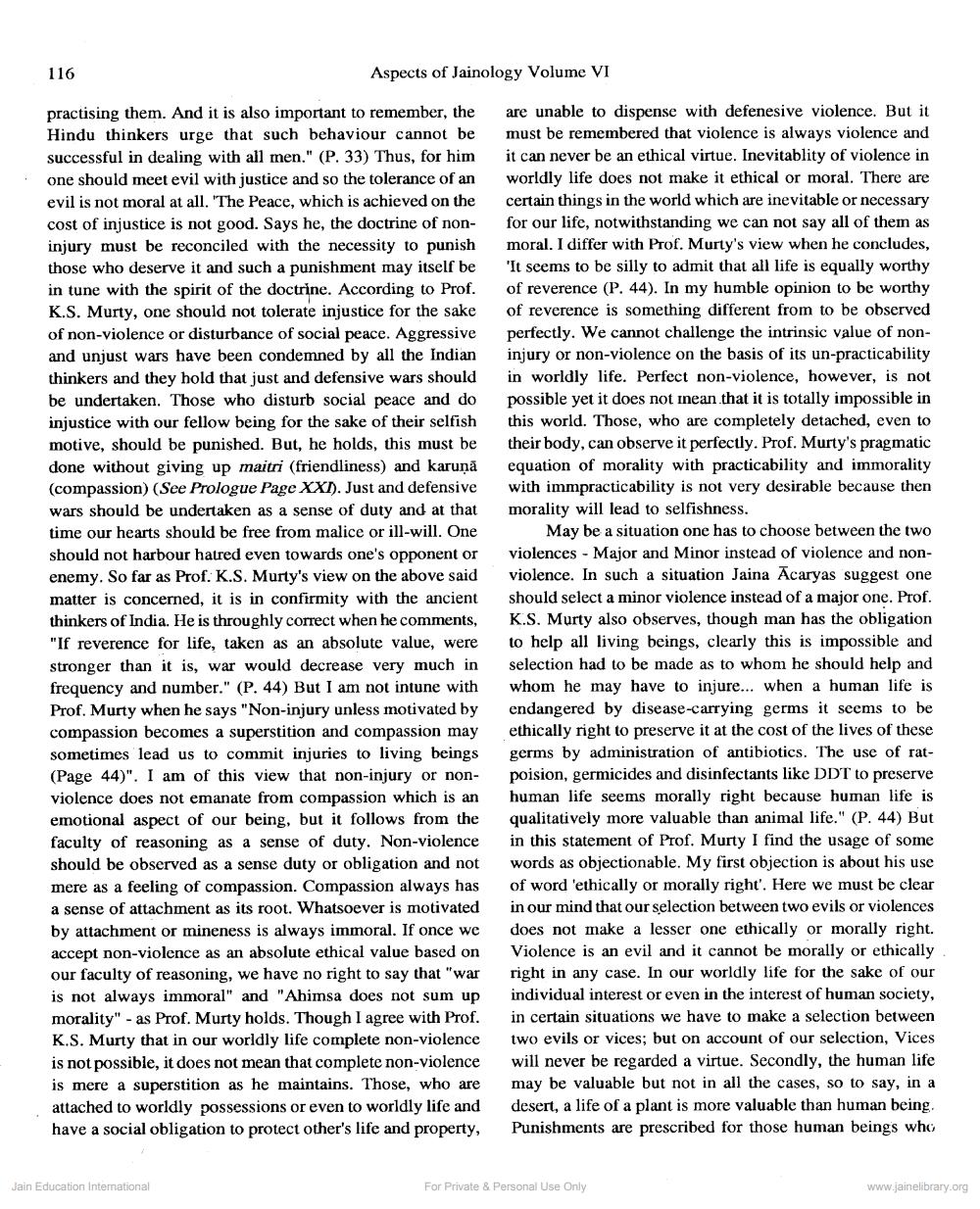________________
116
Aspects of Jainology Volume VI
practising them. And it is also important to remember, the Hindu thinkers urge that such behaviour cannot be successful in dealing with all men." (P. 33) Thus, for him one should meet evil with justice and so the tolerance of an evil is not moral at all. "The Peace, which is achieved on the cost of injustice is not good. Says he, the doctrine of noninjury must be reconciled with the necessity to punish those who deserve it and such a punishment may itself be in tune with the spirit of the doctrine. According to Prof. K.S. Murty, one should not tolerate injustice for the sake of non-violence or disturbance of social peace. Aggressive and unjust wars have been condemned by all the Indian thinkers and they hold that just and defensive wars should be undertaken. Those who disturb social peace and do injustice with our fellow being for the sake of their selfish motive, should be punished. But, he holds, this must be done without giving up maitri (friendliness) and karuņā (compassion) (See Prologue Page XXI). Just and defensive wars should be undertaken as a sense of duty and at that time our hearts should be free from malice or ill-will. One should not harbour hatred even towards one's opponent or enemy. So far as Prof. K.S. Murty's view on the above said matter is concerned, it is in confirmity with the ancient thinkers of India. He is throughly correct when he comments, "If reverence for life, taken as an absolute value, were stronger than it is, war would decrease very much in frequency and number." (P. 44) But I am not intune with Prof. Murty when he says "Non-injury unless motivated by compassion becomes a superstition and compassion may sometimes lead us to commit injuries to living beings (Page 44)". I am of this view that non-injury or nonviolence does not emanate from compassion which is an emotional aspect of our being, but it follows from the faculty of reasoning as a sense of duty. Non-violence should be observed as a sense duty or obligation and not mere as a feeling of compassion. Compassion always has a sense of attachment as its root. Whatsoever is motivated by attachment or mineness is always immoral. If once we accept non-violence as an absolute ethical value based on our faculty of reasoning, we have no right to say that "war is not always immoral" and "Ahimsa does not sum up morality" - as Prof. Murty holds. Though I agree with Prof. K.S. Murty that in our worldly life complete non-violence is not possible, it does not mean that complete non-violence is mere a superstition as he maintains. Those, who are attached to worldly possessions or even to worldly life and have a social obligation to protect other's life and property,
Jain Education International
are unable to dispense with defenesive violence. But it must be remembered that violence is always violence and it can never be an ethical virtue. Inevitablity of violence in worldly life does not make it ethical or moral. There are certain things in the world which are inevitable or necessary for our life, notwithstanding we can not say all of them as moral. I differ with Prof. Murty's view when he concludes, 'It seems to be silly to admit that all life is equally worthy of reverence (P. 44). In my humble opinion to be worthy of reverence is something different from to be observed perfectly. We cannot challenge the intrinsic value of noninjury or non-violence on the basis of its un-practicability in worldly life. Perfect non-violence, however, is not possible yet it does not mean that it is totally impossible in this world. Those, who are completely detached, even to their body, can observe it perfectly. Prof. Murty's pragmatic equation of morality with practicability and immorality with immpracticability is not very desirable because then morality will lead to selfishness.
May be a situation one has to choose between the two violences - Major and Minor instead of violence and nonviolence. In such a situation Jaina Acaryas suggest one should select a minor violence instead of a major one. Prof. K.S. Murty also observes, though man has the obligation to help all living beings, clearly this is impossible and selection had to be made as to whom he should help and whom he may have to injure... when a human life is endangered by disease-carrying germs it seems to be ethically right to preserve it at the cost of the lives of these germs by administration of antibiotics. The use of ratpoision, germicides and disinfectants like DDT to preserve human life seems morally right because human life is qualitatively more valuable than animal life." (P. 44) But in this statement of Prof. Murty I find the usage of some words as objectionable. My first objection is about his use of word 'ethically or morally right'. Here we must be clear in our mind that our selection between two evils or violences does not make a lesser one ethically or morally right. Violence is an evil and it cannot be morally or ethically right in any case. In our worldly life for the sake of our individual interest or even in the interest of human society, in certain situations we have to make a selection between two evils or vices; but on account of our selection, Vices will never be regarded a virtue. Secondly, the human life may be valuable but not in all the cases, so to say, in a desert, a life of a plant is more valuable than human being. Punishments are prescribed for those human beings who
For Private & Personal Use Only
www.jainelibrary.org




